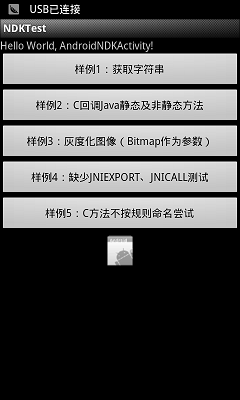Android NDK Sample
基础样例
1)C部分
1.1)TestJni.h
/* * TestJni.h * * Created on: 2011-12-20 * Author: Join */ #ifndef TESTJNI_H_ #define TESTJNI_H_ #include <jni.h> #include <stdio.h> #include <stdlib.h> #include <android/log.h> #include <android/bitmap.h> // 测试回调Java #include "CallJava.h" #define LOG_TAG "JNI_DEBUG" #define LOGI(...) __android_log_print(ANDROID_LOG_INFO, LOG_TAG, __VA_ARGS__) #define LOGE(...) __android_log_print(ANDROID_LOG_ERROR, LOG_TAG, __VA_ARGS__) // JNI调用函数必须要用C编译器编译 // C++不加extern "C",调用会有异常 #ifdef __cplusplus extern "C" { #endif /* * 说明: * 1、JNIEXPORT、JNICALL:jni的宏,在android的jni中不必须 * 2、jstring:返回值类型(对应java的jni基本类型) * 3、C方法名:Java_pacakege_class_method * 4、JNIEnv*、jobject:jni必要参数(分别表示jni环境、java对象) */ // 样例1:获取字符串 JNIEXPORT jstring JNICALL Java_org_join_ndk_jni_TestJni_getStr(JNIEnv*, jobject); // 样例2:C回调Java静态及非静态方法 JNIEXPORT jstring JNICALL Java_org_join_ndk_jni_TestJni_callJava(JNIEnv*, jobject, int, int, int, int); // 样例3:灰度化图像(Bitmap作为参数)(注:android-8才提供Bitmap.h) JNIEXPORT void JNICALL Java_org_join_ndk_jni_TestJni_convertToGray(JNIEnv*, jobject, jobject); // 样例4:缺少JNIEXPORT、JNICALL测试 jintArray Java_org_join_ndk_jni_TestJni_getIntArray(JNIEnv*, jobject); // 样例5:C方法不按规则命名尝试 jint getInt(JNIEnv*, jobject); #ifdef __cplusplus } #endif // C++调用C //extern "C" { //#include "ImageUtil.h" //} //标准头文件为何有如下结构? //#ifdef __cplusplus //extern "C" { //#endif //... //#ifdef __cplusplus //} //#endif #endif /* TESTJNI_H_ */
1.2)TestJni.cpp
/* * TestJni.cpp * * Created on: 2011-12-20 * Author: Join */ #include "TestJni.h" // 样例1:获取字符串 JNIEXPORT jstring JNICALL Java_org_join_ndk_jni_TestJni_getStr(JNIEnv *env, jobject obj) { return env->NewStringUTF("I'm from C!"); } int min(int x, int y) { return (x <= y) ? x : y; } // 样例2:C回调Java静态及非静态方法 JNIEXPORT jstring JNICALL Java_org_join_ndk_jni_TestJni_callJava(JNIEnv *env, jobject obj, int add_x, int add_y, int sub_x, int sub_y) { char str[128]; // 字符数组 int result_add = add(env, add_x, add_y); // 回调Java静态方法求和 LOGE("==[%d+%d=%d]==", add_x, add_y, result_add); int result_sub = sub(env, sub_x, sub_y); // 回调Java非静态方法求差 LOGE("==[%d-%d=%d]==", sub_x, sub_y, result_sub); // 将比较得的整数转成字符串 sprintf(str, "Hello, I'm Join! min=%d", min(result_add, result_sub)); return env->NewStringUTF(str); } typedef struct { uint8_t red; uint8_t green; uint8_t blue; uint8_t alpha; } argb; // 样例3:灰度化图像(Bitmap作为参数)(注:android-8才提供Bitmap.h) /** * bitmap:ARGB_8888,32位ARGB位图 */ JNIEXPORT void JNICALL Java_org_join_ndk_jni_TestJni_convertToGray(JNIEnv * env, jobject obj, jobject bitmap) { AndroidBitmapInfo info; void* pixels; int ret; LOGI("convertToGray"); if ((ret = AndroidBitmap_getInfo(env, bitmap, &info)) < 0) { LOGE("AndroidBitmap_getInfo() failed ! error=%d", ret); return; } LOGI( "color image :: width is %d; height is %d; stride is %d; format is %d;flags is %d", info.width, info.height, info.stride, info.format, info.flags); if (info.format != ANDROID_BITMAP_FORMAT_RGBA_8888) { LOGE("Bitmap format is not RGBA_8888 !"); return; } if ((ret = AndroidBitmap_lockPixels(env, bitmap, &pixels)) < 0) { LOGE("AndroidBitmap_lockPixels() failed ! error=%d", ret); } // modify pixels with image processing algorithm int x, y; uint8_t gray; for (y = 0; y < info.height; y++) { argb * line = (argb *) pixels; for (x = 0; x < info.width; x++) { gray = 0.3 * line[x].red + 0.59 * line[x].green + 0.11 * line[x].blue; line[x].red = line[x].green = line[x].blue = gray; // line[x].alpha = 0xff; // 完全不透明 } pixels = (char *) pixels + info.stride; } LOGI("unlocking pixels"); AndroidBitmap_unlockPixels(env, bitmap); } // 样例4:缺少JNIEXPORT、JNICALL测试 jintArray Java_org_join_ndk_jni_TestJni_getIntArray(JNIEnv *env, jobject obj) { int array[] = { 12, 34 }; // 新建一个int[] jintArray result = env->NewIntArray(2); // 新建一个jintArray env->SetIntArrayRegion(result, 0, 2, array); // 将int[]存入result return result; } // 样例5:C方法不按规则命名尝试 jint getInt(JNIEnv *env, jobject obj) { return 256; }
1.3)回调相关
参照Java JNI简单实现一文,讲了些jni注意点的吧?
2)Java部分
2.1)TestJni
public class TestJni { /** TAG标识 */ private static final String TAG = "TestJni"; /** * 载入动态库 */ static { System.loadLibrary("TestJni"); } /** 样例1:获取字符串 */ public static native String getStr(); /** C回调Java方法(静态) */ public static int add(int x, int y) { Log.e(TAG, "==Java静态add方法=="); return x + y; } /** C回调Java方法(非静态) */ public int sub(int x, int y) { Log.e(TAG, "==Java非静态sub方法=="); return x - y; } /** 样例2:C回调Java静态及非静态方法 */ public static native String callJava(int add_x, int add_y, int sub_x, int sub_y); /** 样例3:灰度化图像(Bitmap作为参数)(注:android-8才提供Bitmap.h) */ public static native void convertToGray(Bitmap bitmap); /** 样例4:缺少JNIEXPORT、JNICALL测试 */ public static native int[] getIntArray(); /** 样例5:C方法不按规则命名尝试 */ public static native int getInt(); }
2.2)AndroidNDKActivity
public class AndroidNDKActivity extends Activity implements View.OnClickListener { /** 标签 */ private TextView text; /** 按钮 */ private Button btn1, btn2, btn3, btn4, btn5; /** 图像 */ private ImageView imageView; @Override public void onCreate(Bundle savedInstanceState) { super.onCreate(savedInstanceState); setContentView(R.layout.main); /* 初始化话各组件 */ text = (TextView) findViewById(R.id.text); btn1 = (Button) findViewById(R.id.btn1); btn1.setOnClickListener(this); btn2 = (Button) findViewById(R.id.btn2); btn2.setOnClickListener(this); btn3 = (Button) findViewById(R.id.btn3); btn3.setOnClickListener(this); btn4 = (Button) findViewById(R.id.btn4); btn4.setOnClickListener(this); btn5 = (Button) findViewById(R.id.btn5); btn5.setOnClickListener(this); imageView = (ImageView) findViewById(R.id.imageView); } @Override public void onClick(View v) { switch (v.getId()) { case R.id.btn1: // 样例1:获取字符串 text.setText(TestJni.getStr()); break; case R.id.btn2: // 样例2:C回调Java静态及非静态方法 text.setText(TestJni.callJava(2, 5, 8, 3)); break; case R.id.btn3: // 获得Bitmap资源(32位) // BitmapFactory.Options options = new BitmapFactory.Options(); // options.inPreferredConfig = Bitmap.Config.ARGB_8888; // Bitmap bitmap = BitmapFactory.decodeResource(getResources(), // R.drawable.ic_launcher, options); Bitmap bitmap = BitmapFactory.decodeResource(getResources(), R.drawable.ic_launcher); // 样例3:灰度化图像(Bitmap作为参数) TestJni.convertToGray(bitmap); imageView.setImageBitmap(bitmap); break; case R.id.btn4: // 样例4:缺少JNIEXPORT、JNICALL测试 int[] array = TestJni.getIntArray(); int len = array.length; StringBuffer sb = new StringBuffer(); for (int i = 0; i < len - 1; i++) { sb.append(array[i]); sb.append(","); } sb.append(array[len - 1]); text.setText(sb.toString()); break; case R.id.btn5: // 样例5:C方法不按规则命名尝试 try { int value = TestJni.getInt(); text.setText(String.valueOf(value)); } catch (UnsatisfiedLinkError e) { text.setText("UnsatisfiedLinkError!"); e.printStackTrace(); } break; } } }
三、后记
整理的基础样例工程,嘿嘿!
注意:
1)需要2.2系统才可,用了Bitmap.h。
2)样例5(不按命名规则的那个),用jni对方法进行注册,不按要求写方法名也是可以的。
3)灰度化是用的标准公式:Gray = R*0.299 + G*0.587 + B*0.114(考虑效率的话,有移位公式)
4)在android-ndk-r6\platforms\android-8\arch-arm\usr\lib目录下是NDK提供的可调用库。(有OpenGL ES^^)
Reprinted from http://vaero.blog.51cto.com/4350852/782787





